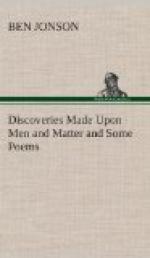INTRODUCTION
Ben Jonson’s “Discoveries” are, as he says in the few Latin words prefixed to them, “A wood—Sylva—of things and thoughts, in Greek “[Greek text]” [which has for its first meaning material, but is also applied peculiarly to kinds of wood, and to a wood], “from the multiplicity and variety of the material contained in it. For, as we are commonly used to call the infinite mixed multitude of growing trees a wood, so the ancients gave the name of Sylvae—Timber Trees—to books of theirs in which small works of various and diverse matter were promiscuously brought together.”
In this little book we have some of the best thoughts of one of the most vigorous minds that ever added to the strength of English literature. The songs added are a part of what Ben Jonson called his “Underwoods.”
Ben Jonson was of a north-country family from the Annan district that produced Thomas Carlyle. His father was ruined by religious persecution in the reign of Mary, became a preacher in Elizabeth’s reign, and died a month before the poet’s birth in 1573. Ben Jonson, therefore, was about nine years younger than Shakespeare, and he survived Shakespeare about twenty-one years, dying in August, 1637. Next to Shakespeare Ben Jonson was, in his own different way, the man of most mark in the story of the English drama. His mother, left poor, married again. Her second husband was a bricklayer, or small builder, and they lived for a time near Charing Cross in Hartshorn Lane. Ben Jonson was taught at the parish school of St. Martin’s till he was discovered by William Camden, the historian. Camden was then second master in Westminster School. He procured for young Ben an admission into his school, and there laid firm foundations for that scholarship which the poet extended afterwards by private study until his learning grew to be sworn-brother to his wit.
Ben Jonson began the world poor. He worked for a very short time in his step-father’s business. He volunteered to the wars in the Low Countries. He came home again, and joined the players. Before the end of Elizabeth’s reign he had written three or four plays, in which he showed a young and ardent zeal for setting the world to rights, together with that high sense of the poet’s calling which put lasting force into his work. He poured contempt on those who frittered life away. He urged on the poetasters and the mincing courtiers, who set their hearts on top-knots and affected movements of their lips and legs:-
“That these vain joys in which their wills consume
Such powers of wit and soul as are of force
To raise their beings to eternity,
May be converted on works fitting men;
And for the practice of a forced look,
An antic gesture, or a fustian phrase,
Study the native frame of a true heart,
An inward comeliness of bounty, knowledge,
And spirit that may conform them actually
To God’s high figures, which they have in power.”




